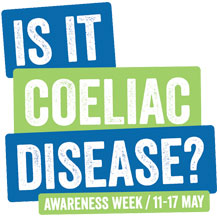Coeliac Disease Awareness Week 2015
 Around 1 in 100 people in the UK suffer from coeliac disease and currently on average it takes 13 years to diagnose. I don’t know about you but I think that’s a ridiculously long time to suffer from an illness without knowing what it is, especially when the solution is simple – remove gluten from your diet. Right now there are around 500,000 people in the UK living with undiagnosed coeliac disease which is why it is more important than ever to raise awareness of the disease, its symptoms, and the simple solution.
Around 1 in 100 people in the UK suffer from coeliac disease and currently on average it takes 13 years to diagnose. I don’t know about you but I think that’s a ridiculously long time to suffer from an illness without knowing what it is, especially when the solution is simple – remove gluten from your diet. Right now there are around 500,000 people in the UK living with undiagnosed coeliac disease which is why it is more important than ever to raise awareness of the disease, its symptoms, and the simple solution.
This week is Coeliac Disease Awareness Week, and Coeliac UK have launched a new campaign ‘Is it coeliac disease?’ in an attempt to reach those half a million undiagnosed people and make them aware of the disease and the symptoms associated with the condition. While generally more people are becoming aware of coeliac disease and gluten free diets, not many understand the symptoms and how they affect people differently before diagnosis – they can even be linked to other illnesses, usually diagnosed as irritable bowel syndrome (IBS).
The campaign hopes to help people suffering the symptoms of the condition get a proper diagnosis so they can be properly supported in managing the disease and avoid long term health conditions. Hopefully the average time it takes for a diagnosis will be halved, along with the misdiagnosis of IBS being reduced by 50%. Finally, the long term goal is to confirm a diagnosis for an additional 250,000 people by 2020 so they are no longer plagued by the uncertainty of the cause of their symptoms, pain and suffering.
Coeliac disease (pronounced see-liac) is a lifelong autoimmune condition where the body’s immune system reacts to gluten. This reaction damages the lining of the intestine causing the body to be deprived of nutrients it needs and can lead to malnutrition. The most commonly reported symptoms include:
- frequent bouts of diarrhoea or loose stools
- nausea, feeling sick and vomiting
- stomach pain and cramping
- lots of gas and bloating
- feeling tired all the time, ongoing fatigue
- anaemia
- weight loss (although not in all cases)
- regular mouth ulcers
- constipation or hard stools
- skin rash
If you think you might suffer from coeliac disease you can take a self assessment here, and learn more about the condition here.
The only treatment is a gluten free diet, and while this sounds like a pretty simple solution, we appreciate that it can be rather difficult to identify products that contain gluten. That’s why we have our section of gluten free alternatives – plus 10% off for Coeliac Awareness Week (offer ends Sunday 17th May 2015).


